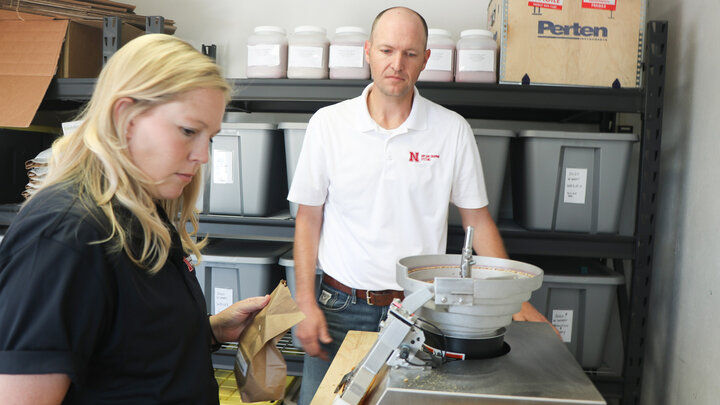In a very short time, Amanda Easterly has become invaluable for her ability to develop comprehensive plans, attention to detail, mentorship and intense passion. She is a research assistant professor for University of Nebraska–Lincoln Department of Agronomy and Horticulture at the High Plains Ag Lab.
The ag lab is a satellite unit of Nebraska Extension Panhandle Research and Extension Center in Scottsbluff. The facility is located six miles north of Sidney off Highway 385, encompassing 2,400 acres of grass and farmland. A third of that land is in dry-land cropping rotation devoted to numerous research trials. In addition to the HPAL research, Easterly oversees nearly 80 research field sites across Nebraska and its surrounding states. She has established very early in her career that she is a detailed planner with the drive for improving agriculture.
Easterly grew up around agricultural research and moved around a lot, living generally in larger communities and suburbs. Finding steady ground in Nebraska, Easterly earned her bachelor’s degree in plant biology from the University of Nebraska-Lincoln. She then went on to Purdue University for a master’s degree studying sorghum breeding and genetics. An opportunity would bring her back to Nebraska to study wheat breeding genetics. Easterly finished her doctorate research focusing on hybrid wheat potential in Nebraska.
Easterly’s extensive education was not what brought her to western Nebraska.
“I married a farmer from Sidney,” she said. “I get to work in research and be involved a little bit in the production side. I am a farm wife, a scientist and a mom.”
She was excited to be able to find a position with the university that allowed her to use her specialized degrees. In February 2018 she started work at the ag lab and has called Sidney her home for the past four years.
Easterly has two daughters: a three-year-old and a nine-month old. The youngest was born before the 2021 wheat harvest and got to tag along with Easterly on many of those busy days.
“I think it is one of the advantages of being in a rural community. Folks see all of who you are,” she said. “The people I get to work with are also my neighbors and my friends. It’s really been fun to be in a small community that’s tight knit.”
As the research assistant professor, most of Easterly’s time is spent coordinating research projects at the ag lab and around the state. She is a member of the Dryland Cropping Systems Program lead by Cody Creech, associate professor, as well as the Crop Performance Testing Program. Creech, the dry-land cropping systems specialist at PREC, said her wheat breeding and statistics background has been an asset to both programs.
“Easterly has been able to leverage these skills to elevate both programs by conducting research and analysis of results that is meaningful to farmers and applicable to the questions they have,” Creech explained.
He also said her passion for wheat breeding aligns perfectly with the goals of the Crop Performance Testing Program. In 2019, the ag lab began overseeing the program that was previously referred to as the state variety trials. Easterly explained that the program involves running tests of different hybrids and varieties of wheat, corn, grain sorghum and spring wheat. The results are then shared with growers giving them an opportunity to see how those yields compare against one another allowing them to make informed decisions.
Creech explained that Easterly meticulously designs field sites to maximize the value of the data collected and quickly gets the results published so farmers can access the data for decision-making. The program has come a long way in the few short years it has been hosted at the HPAL and is recognized as one of the premiere testing programs in the country, according to Creech.
“That’s a lot of fun because it’s similar to breeding and I get to leverage some of that background,” Easterly said.
Researchers, and Easterly herself, refer to her role as the ‘boots on the ground.’ Her position at the ag lab allows her to work directly with students and interns who help collect data and organize the trials. The station hosts graduate students who are working on their master’s or doctorate degrees and undergraduate interns working on their bachelor's degree. Easterly said she had not anticipated how much she would enjoy the opportunity to work with students.
“It’s really a joy to see them grow and develop as scientists, and see their curiosity develop,” she said. “I get to learn from them just as much as I hope they learn from me.”
Creech referred to Easterly as a mentor to the HPAL students. In addition, she also teaches an online experimental field designs and statistics class that Creech said has been well received by her students.
“Dr. Easterly wants each student to develop and improve their skills as scientists so they can accomplish whatever career goals they may have,” he said. “We are all truly lucky to have Dr. Easterly in western Nebraska.”
Though Easterly anticipated she would appreciate her position, being out in the field to see the different varieties and other research progress throughout the season is what she enjoys most. The many meetings involved are possibly the only negative aspect to the role that she can name.
“I really enjoy what I do,” Easterly said. “It’s a lot of work, but it’s a lot of fun.”
Nicole Heldt is a reporter with the Star-Herald, covering agriculture. She can be reached at 308-632-9044 or by email at nheldt@starherald.com.




